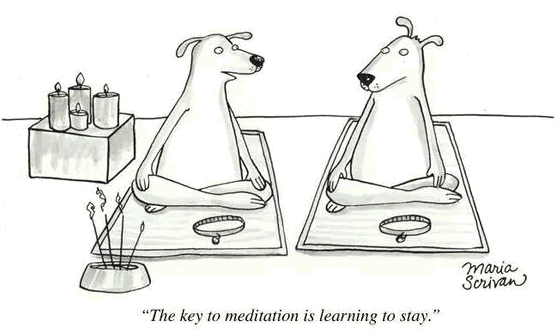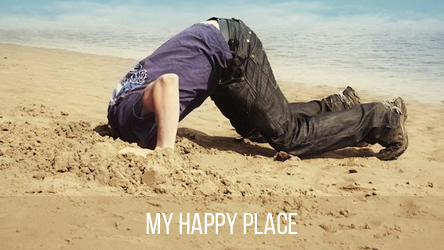
How to fail at meditation
Meditation is hard. I can’t meditate. I’m no good at meditation. I find meditation frustrating. Meditation is boring. These are just a few of the comments I commonly hear from people who have tried to meditate; even from people who have been meditating for...
What else to do with thoughts
In a previous article I introduced five ‘orientations’ for working with thoughts. In this article, I continue that project by offering another five ways to develop greater acceptance — and understanding — of the thinking process. The purpose of these...
What to do with thoughts
I’ve written a number of articles on thinking: specifically, on recognizing that thoughts are a normal and inevitable part of any meditation practice and that a mature response to them involves adopting a stance of acceptance and curiosity. In this article I aim...
Is your happy place really a happy place?
In my role as a meditation teacher, I’m privy to many assumptions about the practice. Such assumptions are most frequently expressed when I’m invited into a workplace, where, not surprisingly, I’m bound to share the room with a number of skeptics. Typically, such...Read more“Pain is inevitable. Suffering is optional. Say you’re running and you think: ‘Man, this hurts, I can’t take it anymore’. The hurt part is an unavoidable reality, but whether or not you can stand anymore is up to the runner himself.”
― Haruki Murakami
Read moreWhen I run a meditation class I usually ask participants what they hope to achieve, or learn, through meditation. Some will say that they want to learn to control their thoughts and emotions. I can understand this impulse. Indeed, many meditation traditions insist that this is just what we must do: because the mind is a wild and unruly beast, and it needs to be tamed.

What meditation technique is right for me?
There are hundreds of different types of meditation. How do you know which technique, or tradition, is right for you? I’d like to propose that this is the wrong question. I don’t believe there is a technique right for you, or anyone. There is no method you...The Problems with Mindfulness Part 2
In Part 1 of this article I explained why a narrow focus on the so-called present moment may create unnecessary difficulties and limitations when practicing mindfulness. In this second part, I’ll endeavor to explain why a non-judgmental attitude can be equally...Confused about Mindfulness and the Present Moment?
Jon Kabat-Zinn, the grandfather of modern mindfulness, defined it thus: “the awareness that arises from paying attention, on purpose, in the present moment, and non-judgmentally.” While other definitions abound, this one is generally considered to be the...
Checking in
It’s not uncommon for people to take up meditation as a means of checking-out. Meditation sounds to them like it might be a good cheap way to escape from the stresses and hassles of the 9 – 5 grind. Like going on a Friday night bender but waking up without...
